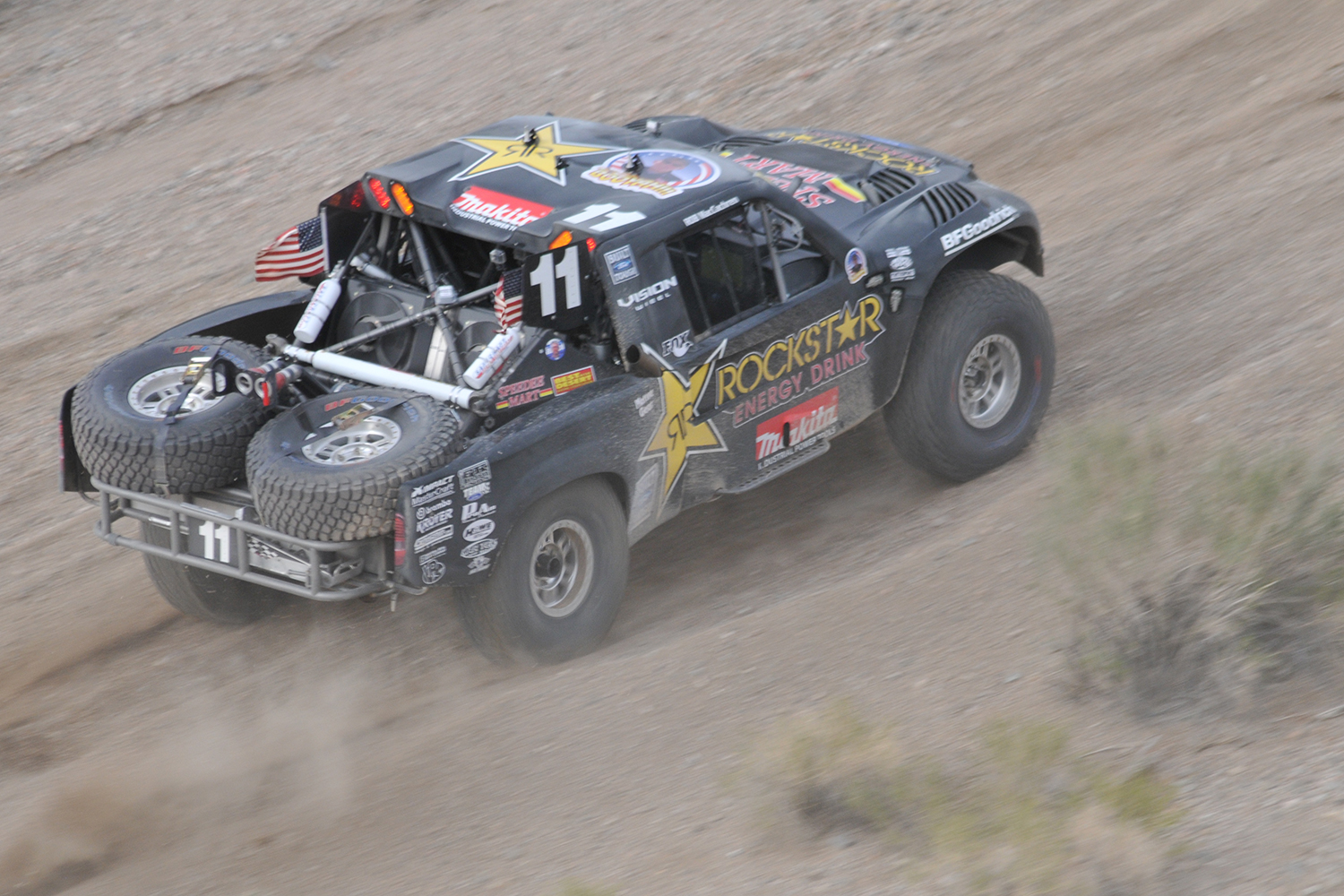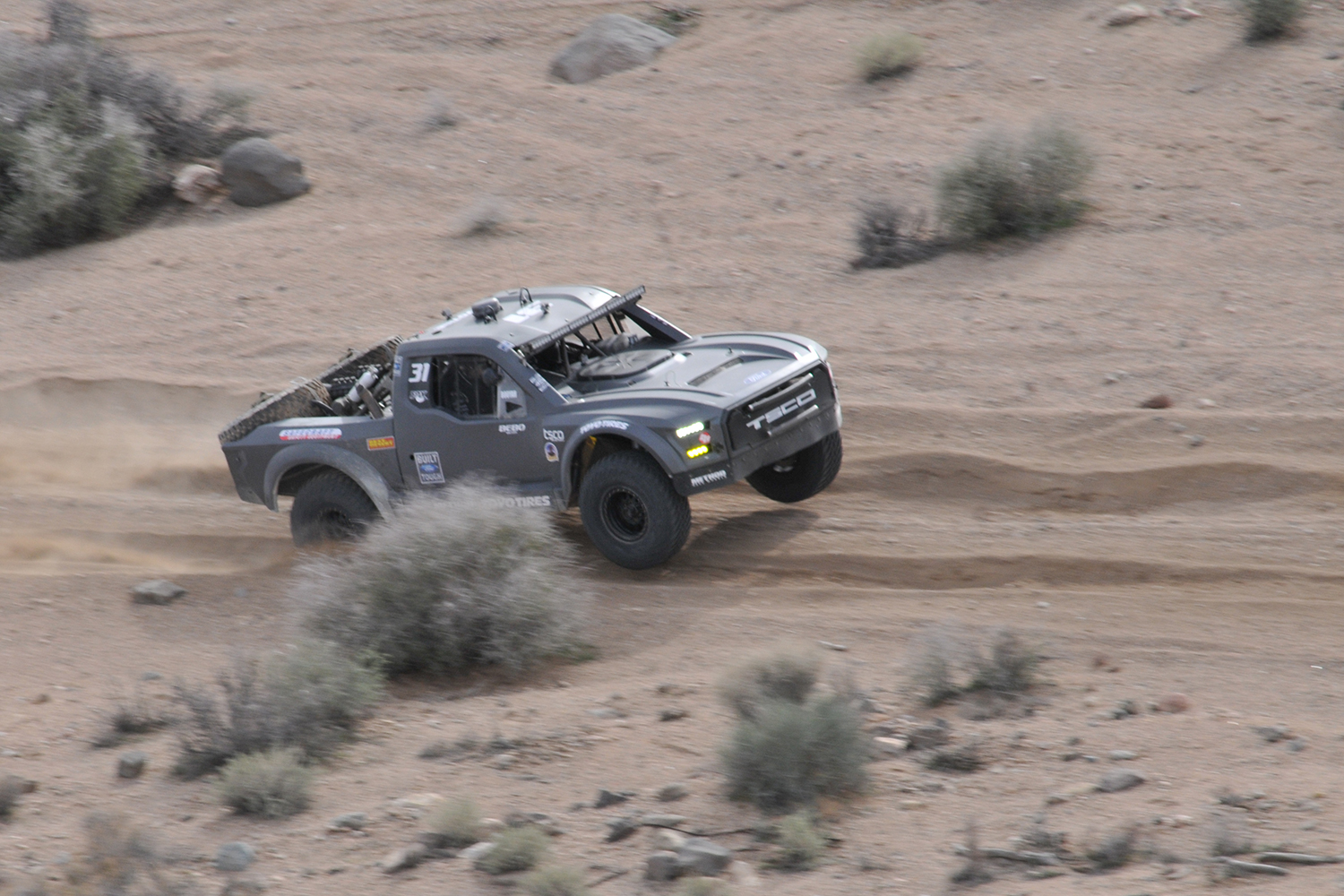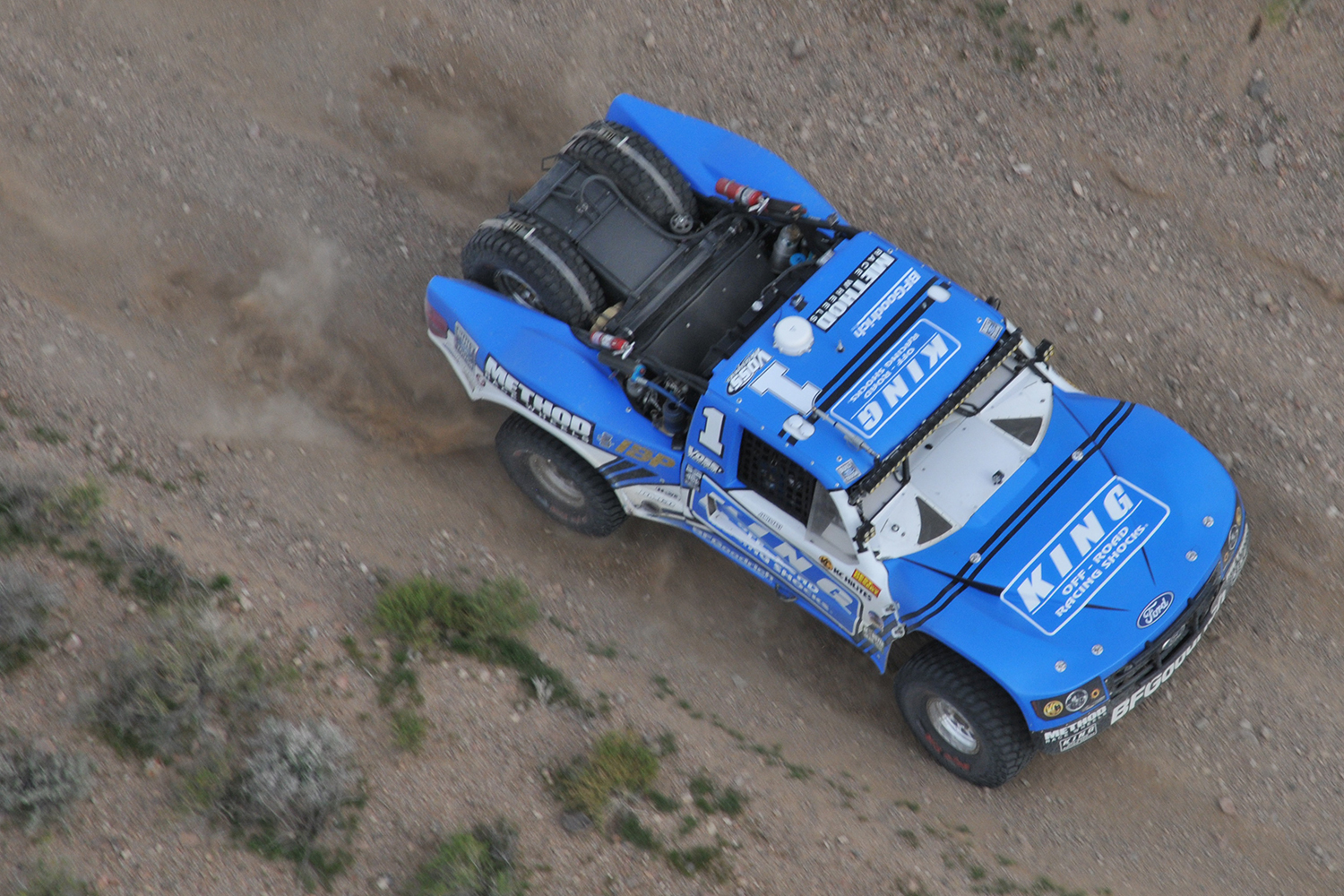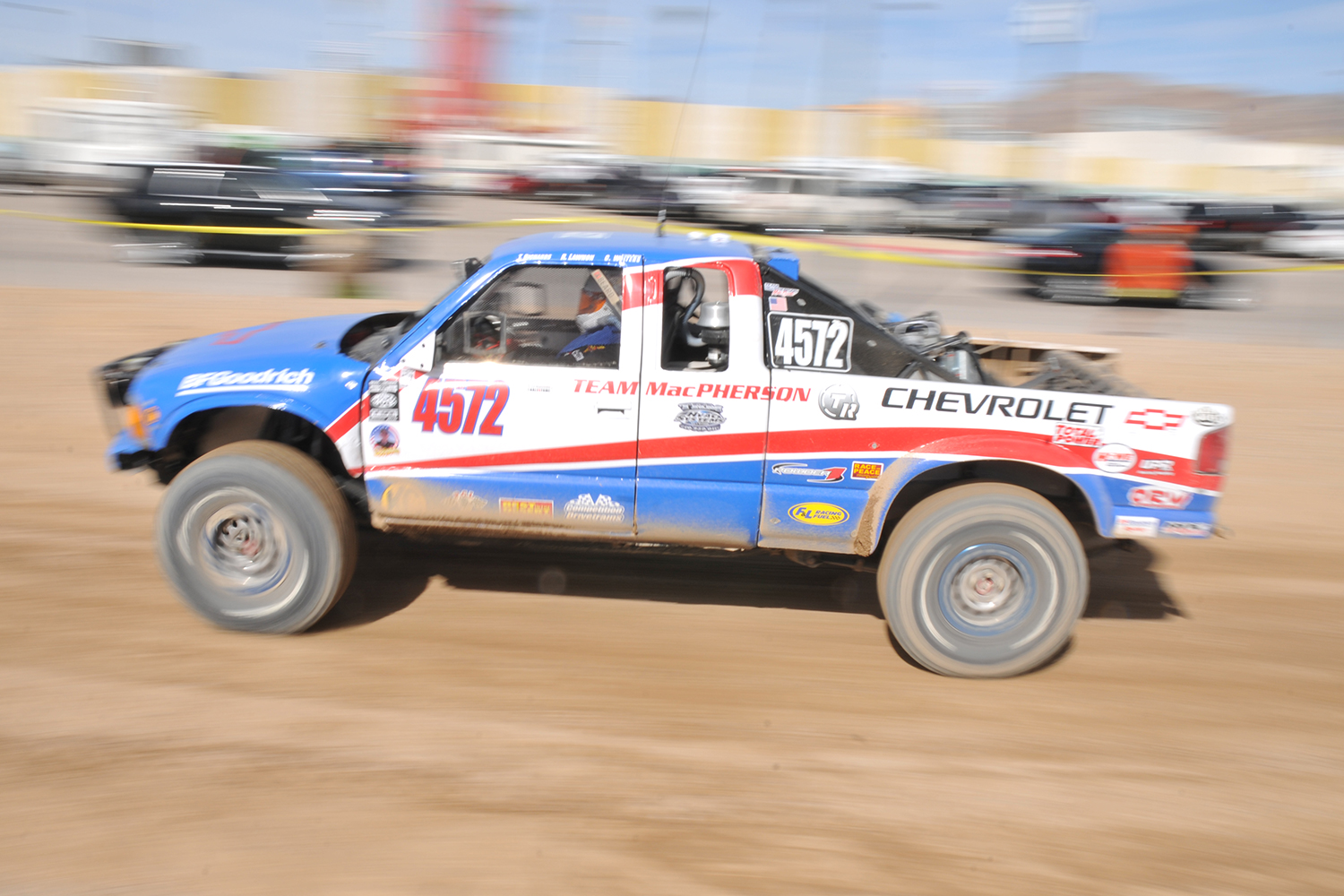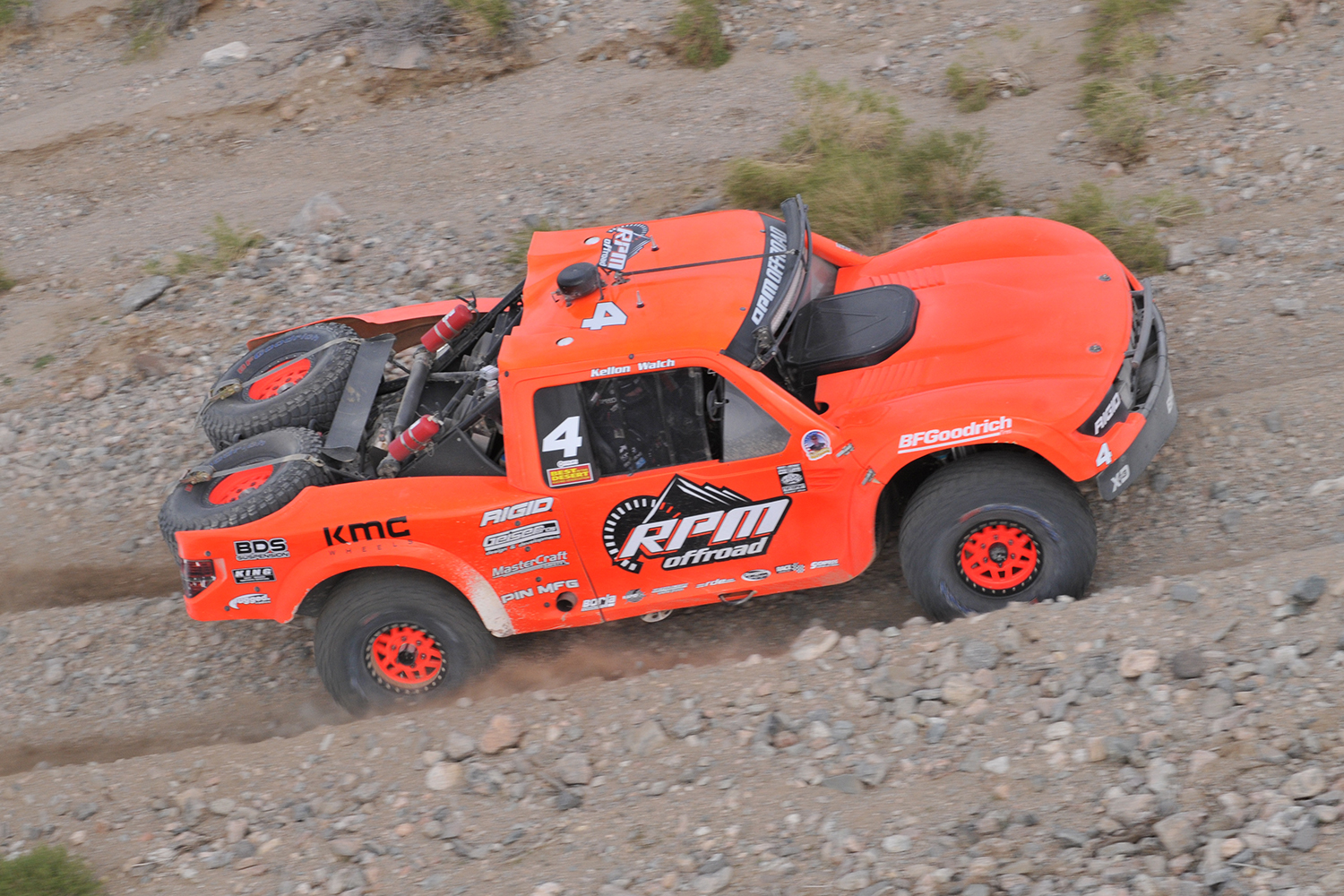
There’s really nothing else quite like off-road racing.
Professional motorsports tends to be comparatively genteel, whether you’re talking about the high-tech engineered precision of Formula One and Le Mans or the relatively primitive NASCAR Sprint Cup cars. In all those series, drivers can expect a smooth road to drive on, and mechanics get a covered garage to do their work. That is, if the series even allows you more than five minutes to fix your car. But in off-road racing you don’t even get a windshield, and if something breaks during the race, the driver and navigator have to fix it themselves out in the desert.
To get a better look at this unique subculture of the racing world, Digital Trends paid a visit to the Mint 400, which has earned its title as the Great American Off-Road Race.
Making the trip
The Mint 400 is held just outside Las Vegas, Nevada, way out in the desert near the California state line. The location is perfect – miles and miles of scrub brush and dry lake beds, but close enough to the most glitzy city in America to provide adequate food, lodging, and entertainment for hundreds of teams and thousands of fans.
We met up with some fellow journalists in L.A. to make the pilgrimage up to Vegas, and as luck would have it we were provided with the perfect vehicles for a civilized trip to the most uncivilized event on anyone’s racing calendar: a brace of Toyota 4X4 pickup trucks. We loaded the trucks with snacks and drinks. No one was going to die in the desert for lack of sustenance.
The drive out from L.A. was uneventful. The Tacoma TRD 4X4 Off-Road was my ride, and for a truck designed to dominate any trail, it delivered surprising comfort on the freeway. We made good time and arrived at the Mad Greek restaurant in tiny Baker, California in time for lunch.
Any time you get automotive journalists together in an unsupervised gathering, adventure lurks in the offing. Realizing that we had, really, all afternoon to make the hour-long shot into Las Vegas, we consulted our phones and found that the desert between Baker and Sin City was blessed with a patchy network of power line access roads, unimproved trails, and gravel roads too obscure to rate an actual name. No one was going to admit that the highway was preferable, so there was only one thing to do.
In off-road racing, you don’t even get a windshield, and if something breaks during the race, the driver and navigator have to fix it themselves
At this point, I could regale you with some high-minded puffery about how we needed to perform field research on the handling characteristics of street-legal trucks in the same desert conditions under which the race was to be held. All better understand the challenges faced by racing teams, Right? But we know that would be errant sophistry, so let’s put aside the pretense and admit that we just wanted to get our hoon on while bombing through the desert.
In practice, it wasn’t all that exciting. Well, except for a few places where the rains had washed a big dip into the road, or deep dry lake silt momentarily stalled our forward progress. The thing about a modern 4WD system is that you just twist the dial to 4X4 and point the truck where you want to go. Even if you did manage to get yourself stuck in the sand, the Tacoma has this thing called “Crawl Control” that will actually dig itself out with no help from you. Not that you’re likely to be helpful anyway, after getting the truck stuck in the first place.
After we got back on the blacktop, the run into Las Vegas returned to the typical. By mutual agreement, traffic moves along swiftly through the Nevada desert. Even if it’s bumper-to-bumper, you’ll be doing at least the 70 mph speed limit. Everyone knows where they’re going and wants to get this drive over with.
The Mint 400
The roots of the Mint 400 go back to 1967, when a good old-fashioned Las Vegas casino tycoon named Dell Webb, owner of the Mint Hotel and Casino on Fremont Street, decided to back an off-road race to promote his business. The event quickly gained stature, with figures such as Parnelli Jones, Al Unser, Mickey Thompson, Steve McQueen, and James Garner participating. Even U.S. astronaut Gordon Cooper took a turn behind the wheel. The Mint 400 became one of the spectacle events that Las Vegas does so well, right up until it ended in 1988.
But in 2008 the time was right for a rebound, and the Mint 400 was revived by off-road racing enthusiast Casey Folks and his Best in the Desert company. For the last 10 years, the Mint 400 has been growing again, pulling in a new set of professional off-road racers, celebrity drivers, and the occasional racing driver from another series. NASCAR and IndyCar driver Robby Gordon won the Mint 400 in 2012, and TV phenom Tanner Foust raced a Polaris RZR buggy this year.
Trick trophy trucks
The current incarnation of the Mint 400 brings together all manner of off-road vehicles in a series of 22 racing classes covering everything from buggies to elaborate and expensive purpose-built trucks. The trucks are the show that everyone comes to see.
In the world of off-road racing, SCORE International calls these unlimited racing rigs “Trophy Trucks” and Best in the Desert calls them “Trick Trucks,” but they’re the same thing. The basic formula is a tube-frame chassis and roll structure with composite bodywork that sort of looks like a truck.
Trophy Trucks, by their nature, have to be extremely strong because we’re constantly trying to bend them in half.
The suspension is completely designed for off-road racing, with up to 28 inches of travel in the front and 32 inches in the rear. Multiple shock absorbers help the trucks soak up the jumps and the bumps. Tires are 39 inches in diameter, and made to grip the dirt and move over deep sand and fine silt. The radiator is mounted in the “bed” of the truck, along with two spare tires and a bunch of tools.
“This is Rampage,” says 2011 Mint 400 winner BJ Baldwin. “We name all our trucks. I’ve won 5 championships in this truck. It weighs 6,200 pounds, which is a little chubby, but the suspension works very well and the chassis is strong. Trophy Trucks, by their nature, have to be extremely strong because we’re constantly trying to bend them in half.”
The engine in a Trophy Truck is a magnificent item. Each engine costs about $75,000, and requires a $20,000 refresh service after every race weekend. Toyota, Ford, and Chevrolet V8s are preferred. The engines are fuel-injected but not supercharged or turbocharged, and they’ll put out between 800 and 900 horsepower and up to 900 pound-feet of torque.
“It’s similar to a NASCAR engine,” Baldwin tells Digital Trends, “but it’s 485 cubic inches, twelve-and-a-half-to-one compression, and a 7400 RPM redline. It’ll make 147 miles an hour.”
The engines are backed up with either an automatic or sequential shift racing transmission, built for toughness. You might think that trucks like these would have 4WD, but most are simple solid-axle rear-wheel-drive designs. All in, you’re looking at about $500,000 worth of hardware.
But besides looking like something from the latest film in the Mad Max franchise, these trucks can fly, land, and never break their stride. If they roll over, the team just rolls them back on their wheels and takes off again. At least for the duration of the race, a Trick Truck is nearly indestructible.
Baldwin qualified his “Rampage” Tundra in 10th position at the start, but drove to a 4th place finish out of 35 Trick Trucks entered in the Mint 400 this year.
The rest of the race
Trucks may get the glory, but the bulk of the Mint 400 involves less expensive and elaborate vehicles, including limited and stock trucks, buggies, and even classes for the venerable Baja Bug and Jeep Cherokee.
“In an F1 race, those drivers make split-second decisions, but this is a kind of racing at a speed I can enjoy”
“The truck I’m racing is a Spec Trophy Truck,” says competitor Jim Riley. “There’s a limitation on the motor, so we use a Chevrolet LS3, we have 37-inch tires, and you have to run a Turbo-400 transmission. Apart from those three specs, it’s unlimited.”
The goal for a Spec class is that by taking the expensive engines off the table, the cost of off-road racing can be kept closer to Earth.
“What it’s done is brought the cost of Trophy Truck racing down, but keeps the creativity for everything else,” Riley explains. “My motor costs $7,000, and I can get a year of competition out of it.”
Among the most interesting cars on display at the Mint 400 is Riley’s 1957 Chevrolet two-door. The car is an unlikely off-road racing veteran dating back to the 1960s.
“This car has won 48 races, nine championships, and eight Baja 1000s,” Riley says with pride. “The goal for me is to maintain the vintage character, so that when we drive it, we can feel what it was like back then. This is about as vintage as it gets.”
This year, comedian and all-around car guy Jay Leno was on hand to race in the Pure-Stock Production Mid-Size Pickup class. Leno landed a seat in Camburg Racing’s Toyota Tacoma, with co-drivers Jerry Zaiden, Fred Williams, and Ryan Millen. The Camburg team brought home the class win, and Leno is always a crowd favorite.
“It’s fun because we’ve got time. You can take two seconds to look at the road,” Leno said after the race. “In an F1 race, those drivers make split-second decisions, but this is a kind of racing at a speed I can enjoy.”
Everyman’s off-road race
Just about everyone has dreamed about running the Baja 1000 or just screaming across the desert and taking a few jumps, but the cost of top-level truck racing is prohibitive. Yet Riley points out that there are options within reach for people who really want to get involved.
“The incredible opportunity of off-road racing is that there are 22 different classes here,” he explains. “You can be that garage mechanic and do something. Maybe you aspire to run in something that you built yourself on a weekend budget, and you can do that here. The morning race has the Sportsman classes, and that’s where you can race something like that. The afternoon race is where they bring out the million-dollar toys. That doesn’t mean it’s any more fun – it’s just different.”
As the wise people often say, you’ll never know unless you try.

